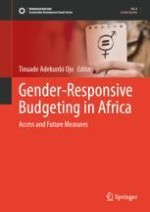2024 | OriginalPaper | Buchkapitel
7. Gender Pay Gap and Pension Fund for Women in South Africa
verfasst von : Tinuade Adekunbi Ojo, Zainab Monisola Olaitan
Erschienen in: Gender-Responsive Budgeting in Africa
Verlag: Springer Nature Switzerland
Aktivieren Sie unsere intelligente Suche, um passende Fachinhalte oder Patente zu finden.
Wählen Sie Textabschnitte aus um mit Künstlicher Intelligenz passenden Patente zu finden. powered by
Markieren Sie Textabschnitte, um KI-gestützt weitere passende Inhalte zu finden. powered by
